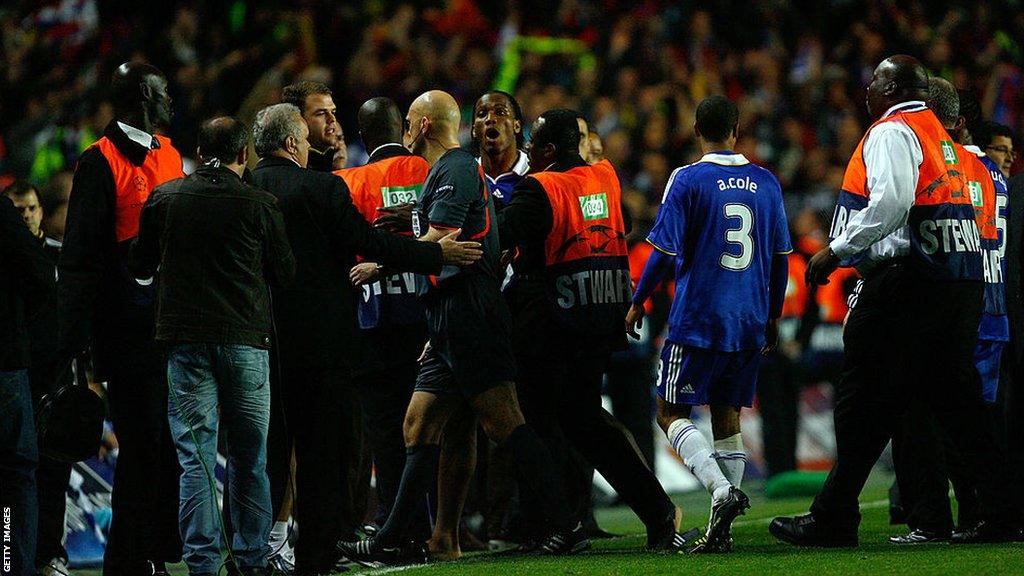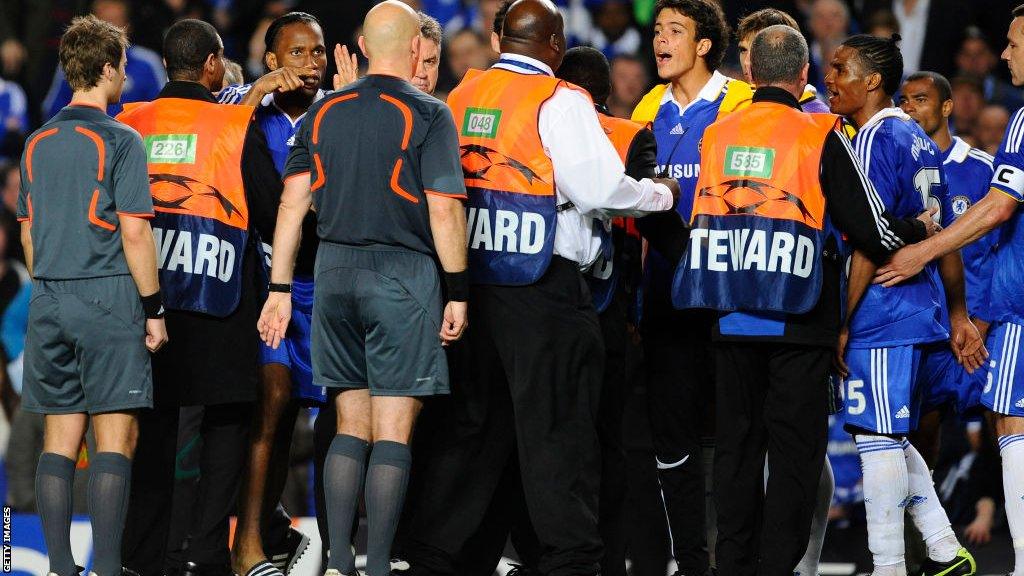Tom Henning Ovrebo: Ex-referee given death threats wants officials to speak to media
- Published

Didier Drogba won the Champions League with Chelsea in May 2012, scoring the winning penalty in a shootout victory over Bayern Munich
Former referee Tom Henning Ovrebo says officials should be allowed to speak to the media after matches.
The Norwegian was subjected to death threats for his decisions in an infamous Champions League semi-final between Chelsea and Barcelona in 2009.
Ovrebo felt a chance to "explain" his decisions would have diffused things.
"It would have been easier, looking at it now, to have a short press conference and talk about the match," he told BBC Radio 5 Live Breakfast.
"Then it would've maybe quietened down a bit more earlier. I was not allowed by Uefa to talk to the press."
The match overseen by Ovrebo has gone down as one of the most controversial in Chelsea's history and was marred by fractious scenes at the full-time whistle.
Chelsea felt they had four strong shouts for penalties before Barcelona won the semi-final on away goals with a 93rd-minute Andres Iniesta strike.
After the 1-1 second-leg draw, Chelsea striker Didier Drogba ran on to the pitch - wearing flip flops - to confront Ovrebo at the final whistle and was booked.
Drogba then shouted and swore into TV cameras, gesticulated wildly, labelled the referee a "disgrace", external before being restrained as Ovrebo went down the tunnel.
Chelsea's then captain John Terry also remonstrated with Ovrebo and condemned the decision to select him as referee for the tie.
Ivorian Drogba was subsequently banned for four matches, external by Uefa for his behaviour at the end of the game at Stamford Bridge.
In the fallout from the match Ovrebo was denied the chance to give his version of his events immediately afterwards and was instead forced into a "kind of hide and seek" as both he and his family were sent death threats.
Ovrebo, who reflected on the tumultuous game in London to Rachel Burden as part of 5 Live's 'Focus on Football week', felt the sting could have been taken out of the nasty aftermath 14 years ago.
"One thing is to target me as the referee, and I'm in a way prepared for it, but also when they come to your house, that is not nice," the 57-year-old said.
"If you had a short press conference or something like that you could explain your experiences, and the different calls you took. That would've been easier.
"Looking at it now I think it would've quietened down some of the noise because the media, and especially the media in England, can be quite harsh.
"In Norway, referees are allowed to talk to the press, we don't have as many problems with openness so that could be something to think about in [other] leagues as well."
Current VAR 'can't continue' but would have 'helped' in 2009

Norwegian referee Tom Ovrebo retired from officiating in October 2013
Ovrebo said he would have appreciated the presence of the video assistant referee in 2009 to help deal with difficult decisions during a highly contentious match.
"As a referee you have to take quick decisions and something those decisions are not 100% correct," he explained.
"They are controversial and sometimes 100% wrong so I think that having VAR in a match like that would definitely have helped us as a referee team.
"It would also have been good for the teams and that's the most important thing. It's not only for us referees but for the teams and the players and the supporters to have a correct decision."
However, Ovrebo said VAR in its current form should be scrapped until the system can function more smoothly.
He added: "We can't continue to use it as we are because it's too time consuming and theoretical... but if they find a better way to use it, I'm positive."